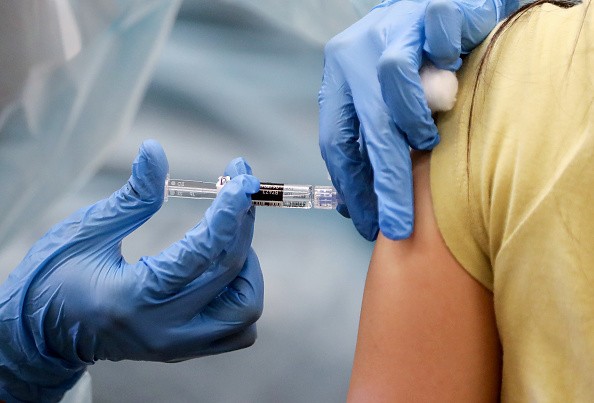Medicare, Medicaid to Pay for Future COVID-19 Vaccine
Medicare and Medicaid will pay for any COVID-19 vaccine authorized or approved by the U.S. Food and Drug Administration (FDA) in the future, according to a new policy announced Wednesday.

The new rule from the Centers for Medicare and Medicaid Services (CMS) covers the COVID-19 vaccine, free to beneficiaries under Medicare and Medicaid.
This decision covering the cost of a vaccine for Medicare and Medicaid is a change from the current policy.
According to The Hill, the cost of injecting the vaccine will be reimbursed by Medicare. If two doses of the vaccine are needed, Medicare will also pay more for the second dose.
Beneficiaries on Medicaid will also be covered for their COVID-19 vaccines with no cost during the public health emergency.
CMS said the new policy would allow for "broad vaccine access and coverage for all Americans."
The agency also announced plans to help with larger coverage of COVID-19 treatment costs that Medicare beneficiaries may be receiving.
It is still unclear how the agency plans to pay for vaccines' cost for roughly 120 million Americans under Medicare and Medicaid coverage, said Politico.
In March, the CARES Act was passed by Congress in an effort to make vaccines free of charge. But rules on Medicare about emergency use drugs prevented that.
Medicare is a federal program that provides health coverage for the elderly or under 65 years old with disability, while Medicaid is a state and federal program that provides health coverage for people with very low income.
How About Private Insurance?
The new CMS policy implemented a provision from the CARES Act that covers Americans with private insurance.
Under the policy, Americans under most private health insurance plans will have COVID-19 vaccines covered without sharing from both in- and out-of-network providers. The provision on private insurers will last throughout the course of the public health emergency.
For individuals who aren't insured, providers will also be reimbursed for administering the vaccine through the Provider Relief Fund.
What Will Be Covered?
For those under Medicare, Medicare Part B will cover any expenses in administering future vaccines, CNN reported.
Medicare Part B covers doctor visits and outpatient services like lab tests, medical equipment and diagnostic tests.
"The rule removes any existing ambiguity surrounding Medicare's coverage of the Covid-19 vaccine," said CMS administrator Seema Verma in a briefing Wednesday.
Based on her estimates, Verma said it could cost around $2.6 billion of "literally every senior got immunized" under the Medicare program.
She made it clear that once providers are given free COVID-19 vaccines from the federal government, they are prohibited from charging additional costs.
"Surprise or balanced billing for vaccine costs is strictly prohibited," she said.
Early this month, the administration announced an agreement with retail pharmacies to help distribute COVID-19 vaccines eventually. The agreement's goal is to also reach long-term care facilities like nursing homes, with no out-of-pocket costs.
Four vaccines are currently in their final stage trials, showing promise of approval. But even if the company files for emergency authorization by next month, it's unlikely the approval can be granted this year.
In addition to coverage of a vaccine, the CMS also outlined plans to cover a "new generation of COVID-19 treatments" like antibody drugs.
"Our job at Medicare is to make sure that these medications, when they come into the market... can be immediately accessed by seniors who need them," Verma noted.
CMS plans to restructure reimbursement for treatment costs that are yet to be approved.
Check these out:
Heart Damage Among COVID-19 Patients Lead to Higher Risk for Death, Study Finds
COVID-19 Study: Immunity From Antibodies Could Wear off Over Time
Subscribe to Latin Post!
Sign up for our free newsletter for the Latest coverage!
© 2026 Latin Post. All rights reserved. Do not reproduce without permission.














